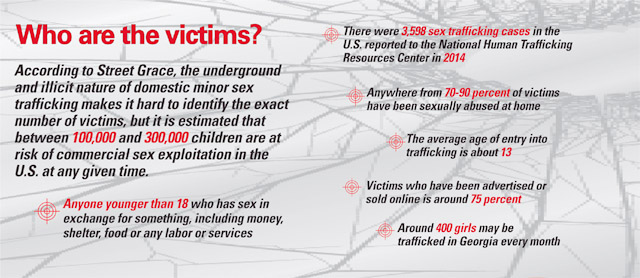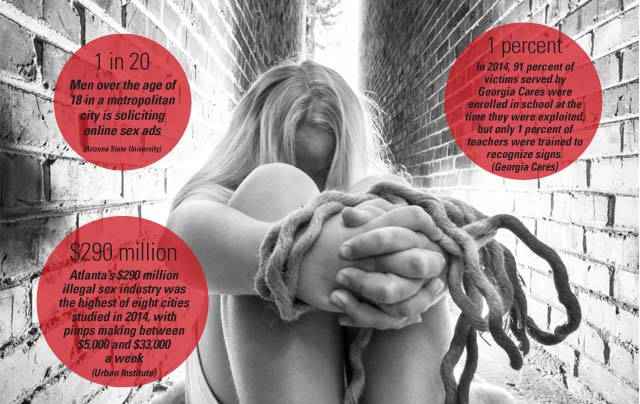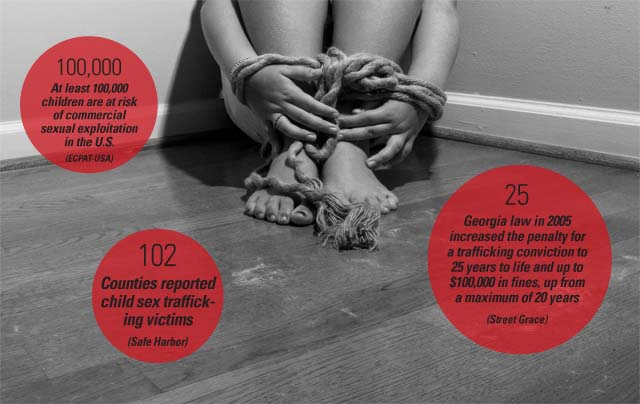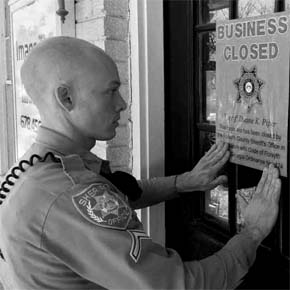FORSYTH COUNTY – The offer came through via text at 5 p.m.: $120 for 15 minutes of sex with the barely legal girl from the online ad. After 15 minutes without a response, he texted again. $150.
That’s way more than what you normally get for 15 minutes, said the women behind the computer. Normal, she said, is $50, though she has seen it as high as $250.
The ad was for a fake girl. It was created by the woman behind the computer, Whitney Bexley, for an undercover research and outreach operation called Transaction Intercept. The goal: to deter men from buying sex with young women who, sometimes to the men’s knowledge and sometimes not, are often children.
The ad offered sex with a girl in Forsyth County, and while there was no girl being sold this time, the caller was real.
He was one of 67 men who called or texted during a 15-hour period, inquiring about one of two ads posted by Bexley, director of strategic initiatives for Street Grace, a faith-based nonprofit committed to ending the demand for child sex trafficking.
The Forsyth County News observed the operation, during which volunteers informed the men that their number was now recorded in a database and offered links to sex addiction and trauma therapy resources.
“We’ll post ads in Norcross, Duluth, Lawrenceville, Johns Creek area, Alpharetta … Cumming, the Forsyth area,” Bexley said. “Every time we have callers.”
The rush in calls comes between 2 and 6 p.m. The time, one undercover volunteer said during the operation, they can set a meeting up while “they’re not sitting at home next to their wife.”
Those callers, had they completed the act, would have had something in common with a majority of the men paying for sex with children in the Atlanta area — they live outside of the Interstate-285 perimeter, according to Street Grace and a 2010 study by The Shapiro Group.
“[In] 2005 is when … we all believed it was the airport area. That these weren’t our men that were buying, [that] they were flying in, doing their business and leaving, and they were all sold around the airport,” Bexley said.
The study found that happening, but only about 9 percent of the time.
“Then the next thing was, ‘Well, it must be in the city. It’s the urban center, it’s seedy, it’s dangerous, huge. Millions of people down there,’” she said. “And we found out again, yes, that’s true, but it’s about 26 percent of the time.
“The vast majority of the demand – 65 percent of the demand — comes from outside of the perimeter, and 42 percent of the 65 comes from north of the perimeter, particularly from that 75-85 corridor.
“And that was the most shocking thing to some folks because they were like, ‘Wait. That’s our churchgoing folks. That’s our ball team people, you know, and what it comes down to is that’s where the disposable income is.”

---
THE FACE OF SEX TRAFFICKING IS NOT WHAT YOU THINK
---
This is not just a north metro-Atlanta problem, Bexley said. It’s happening in every city, in every neighborhood in the nation.
Cases have been reported in 102 counties in Georgia — 60 percent of the state, according to Safe Harbor.
In 2014, the National Human Trafficking Resource Center hotline received reports of 3,598 sex trafficking cases in the U.S., though it is estimated that at least 100,000 children are at risk of commercial sexual exploitation.
Street Grace estimates as many as 400 girls are trafficked in Georgia every month.
Trafficking has a different face now — it is less of the traditional snatch-and-grab scenario.
Domestic minor sex trafficking occurs any time someone younger than 18 has sex in exchange for something of commercial value, from money to food to shelter, according to the Trafficking Victims Protection Act of 2000. It does not have to be physically forced upon the victim.
In fact, that has been one of the hardest aspects to combat.
“So many of these kids are being exploited by somebody that they know. A lot of the times, their parents are the one doing the exploiting,” Bexley said. “And often times, the ones who are buying are not the Boogeyman. They’re not all pedophiles either, which is really interesting. They are people who have disposable incomes, and they are looking to have sex and they don’t care who they’re having sex with.”

Lauren Williams knew her pimps, and her story follows one that is heard often by Bexley and others.
Williams, a north metro-Atlanta resident whose name has been changed, did not have present or stable parents. After beginning to use drugs, she was raped “at an early age. I had plans to wait until I was married, now I felt so alone, abandoned and violated.”
Her drug use increased to cope with the trauma. She began to think sex was “not a big deal.”
When her child came into the picture, she began stripping to put food on the table, falling into relationships with abusive and manipulative men because that’s all she ever knew.
“I was just seeking basic necessities and ended up with men who only wanted to use me and take advantage of my situation,” she said. “After moving in with another guy, prostitution began all over again in order to make ends meet and find a way to survive.
“I found myself on the ground crying on a cold and hard concrete floor asking, praying and seeking God, ‘Is this all there is to life? When will the pain ever stop? Does He even hear me cry?’”
---
THE FAMILY’S DIRTY SECRET: SEXUAL ABUSE AND THE BRIDGE TO PROSTITUTION
---
If unstable childhoods put girls at a higher risk of prostitution or being trafficked, those in foster care are even more vulnerable.
“What we know about children who are in foster care is they have a lack of stability. So they could be living in one place for a month or six months and somewhere else the next, so their sense of community is constantly eroded,” said Emma Wiltshire, family counselor for Supporting Adoption and Foster Families Together, or SAFFT, a Forsyth County-based nonprofit that expects to serve more than 400 families this year.
Wiltshire said that makes them vulnerable to develop unhealthy friendships and relationships due to a lack of stable parental figures.
“I’ve talked to girls who started using drugs when they were 12, 13 and started having sex when they were 10, 11,” she said.
Sexual abuse often is associated with children in foster care and is a gateway to trafficking, said Brian Anderson, executive director of SAFFT.
“We have learned that when kids are in foster care, they have gone through tremendous trauma. They have gone through very unnatural things for a child. They’ve been removed from their family. They’ve been removed from their church. They’ve been removed from their school system, typically from their friends,” Anderson said.
He said while one in four girls and one in six boys in the nation are sexually molested, “in the last 12 months we can see in our stats here in Forsyth County that zero percent of the kids that have been placed into state care were placed because of sexual allegations that were substantiated.”
According to SAFFT, 40 percent of sexual abuse cases involve relatives.
“So nobody talks about it. It’s a secret, and kids that grow up with sexual abuse from their relatives understand that that is their normal, and if someone who loves them sexually abuses them, then that is what love means. So that defines their love language.”
Anderson said he and his wife, Ashley, took in a teenager as a foster child who told them she “was effectively homeless” for seven years.
“She would live with friends, she would live with uncles, aunts, different people that would take her in, and she got all her basic needs met — she was very resourceful — but something that always stood out to me was that she had said that sexual abuse in the homes that she lived in temporarily was just what she was used to.”

---
GEORGIA AMENDMENT 2: THE SAFE HARBOR FOR SEXUALLY EXPLOITED CHILDREN FUND
---
Street Grace and Transaction Intercept may be working to end the demand, but until that happens, rescued victims remain with minimal resources.
Georgia voters have a chance on Tuesday to vote for or against an amendment to the state Constitution that would create a fund for child sex trafficking victim resources.
Amendment 2, which will be on every Georgia voter’s general election ballot, would create the Safe Harbor for Sexually Exploited Children Fund to provide restorative care, advocacy and awareness campaigns, rescue services, housing, education, medical care, counseling, mental health care, life and job skills training and transitional support, said Bob Rodgers, CEO of Street Grace.
“It is the fastest-growing underground criminal activity on the globe and second only to drug trafficking, and it will surpass it in the next five years,” Rodgers said. “This is not a problem that happens in other states and other communities. It is statistically occurring in your neighborhood and in your community.”
Rodgers said it is anticipated the state fund would generate up to $2 million a year.
Funding would come from taxes on adult entertainment establishments — 1 percent of annual gross income or $5,000 annually — and increased fines on people charged with trafficking — both buyers and sellers.
Bexley said she has heard concerns that the burden of the fees would be placed on the dancers, but she said she understands they would be assessed “more from alcohol sales and cover charges.”
Concerns over the fees being placed on cover charges, and therefore the patrons, she said, are also unfounded.
“There are folks that think the adult entertainment industry has nothing to do with this and it’s not fair and that fee is going to be passed along to the folks who are patronizing, so it’s really a tax on the citizens,” she said. “When you think about $5,000 annually or 1 percent annually, I mean what’s that going to be, a nickel on your entry fee? It’s a drop in the bucket for what these folks are taking in a night.”
She said some strip clubs say they want to help combat child sex trafficking.
“I say, put your money where your mouth is,” she said. “Children are working in these clubs, whether the management knows it or not.”
The ballot question was passed in the Georgia General Assembly earlier in 2016 by 85 percent.
What little resources already exist have a high, but costly, success rate — as much as $80,000 a year for one child, according to Safe Harbor and Street Grace.
“Most of the women who come in are very, very broken. Very torn,” said Cheryl Miller, with House of Cherith. “Many of them come in very abused. It’s happening so often with the young women not realizing that is it a form of exploitation, whether they’re using drugs and they believe I just need to go out there and get a quick fix for the moment, and this is what my boyfriend is telling me is the easiest way to do it.
“Sometimes their lives get accustomed to doing it, and so they think that it’s the right thing to do until someone shares with them … hey, you can live a different life. You don’t have to do this.”
Lauren Williams was eventually accepted to House of Cherith, a safe house and recovery program for adult sex trafficking victims at City of Refuge in Atlanta — WellSpring Living is a program under the same umbrella for minors, one of less than five in the state.
“My life is slowly changing with each passing day,” she said. “God has opened my eyes to see the love that He has for me, and I am no longer the same. I no longer carry guilt and baggage, shame and feelings of [being] unwanted.
“Just the love that we can pour into these ladies, I’m telling you it’s just unspeakable joy. They accept it. They want to be loved.”
For more information on Amendment 2 and child sex trafficking in Georgia, click here.
![]()
LAW ENFORCEMENT RESPONSE A KEY TO THE PUZZLE

While Safe Harbor can create a dedicated fund for victim resources, and while groups like Street Grace are working to identify the buyers and their reasons, they cannot force perpetrators to suffer consequences of buying and selling children for sex. That’s where law enforcement comes in.
Laws have strengthened in Georgia to sentence convicted human traffickers 25 years to life and up to $100,000 in fines, up from a maximum of 20 years.
After the Forsyth County Board of Commissioners passed an ordinance in January to put restrictions on massage parlors to prevent situations that promote prostitution and illicit activity, Forsyth County Sheriff’s deputies shut down six parlors in violation of the ordinance and cited five in March.
Though no one was arrested that day — the Forsyth County News followed a unit during the sweep — several property owners were denied permits to even open due to prostitution charges uncovered during background checks.
The ordinance requires a massage parlor in Forsyth County to have a licensed massage therapist on site during business hours and prohibits windows from being tinted black or covered and beds from being inside, among other rules.
The operation was largely a response to a surge of illegally operating such businesses in the last few years.
That trend developed in Forsyth after neighboring jurisdictions, notably Johns Creek, enacted similar laws that pushed parlor owners to open in other areas.
“It’s meant to protect the legitimate businesses, and [District 2 County] Commissioner [Brian] Tam kind of took the lead on it and wrote this pretty lengthy ordinance to firmly protect legit businesses but to clamp down and close down the ones that are fronts for prostitution,” Maj. Rick Doyle said at the time.
Nationwide, the Federal Bureau of Investigation partnered with a handful of agencies in October for Operation Cross Country X, an effort to target underage human trafficking.
In Georgia, 15 pimps and traffickers and 54 adult prostitutes were arrested, including five pimps in Alpharetta. Their ages ranged from 19 to 55.


